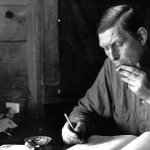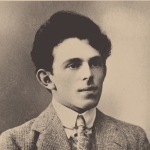C. Damon, come drive thy flocks this way.
D. No, ’tis too late; they went astray.
C. I have a grassy scutcheon spied,
Where Flora blazons all her pride.
The grass I aim to feast thy sheep:
The flowers I for thy temples keep.
D. Grass withers; and the flowers too fade.
C. Seize the short joys then, ere they vade,
Seest thou that unfrequented cave?
D. That den?
C. Love’s Shrine.
D. But virtue’s grave.
C. In whose cool bosom we may lie
Safe from the sun.
D. Not heaven’s eye.
C. Near this, a fountain’s liquid bell
Tinkles within the concave shell.
D. Might a soul bathe there and be clean,
Or slake its drought?
C. What is’t you mean?
D. These once had been enticing things,
Clorinda, pastures, caves, and springs.
C. And what late change?
D. The other day
Pan met me.
C. What did great Pan say?
D. Words that transcend poor shepherds’ skill,
But he e’er since my songs does fill:
And his name swells my slender oat.
C. Sweet must Pan sound in Damon’s note.
D. Clorinda’s voice might make it sweet.
C. Who would not in Pan’s praises meet?
CHORUS
Of Pan the flowery pastures sing,
Caves echo, and the fountains ring.
Sing then while he doth us inspire;
For all the world is our Pan’s choir.




















Comment form: